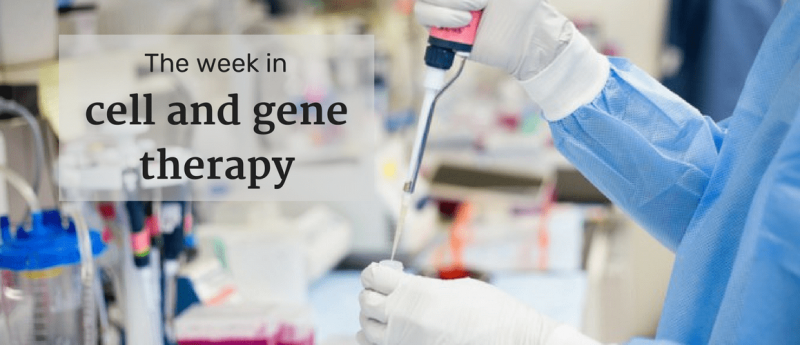Cell therapy weekly: Pluristem secures €50 million to apply cell therapy to COVID-19

This week: iPSC-derived beta cells show promise as potential replacement therapy, resTORbio and Adicet Bio to merge and focus on allogeneic T-cell therapies, and FUJIFILM Diosynth Biotechnologies and OXGENE partnership aims to reduce gene therapy lead time.
The news highlights:
Pluristem secures €50 million to apply cell therapy to COVID-19
iPSC-derived beta cells show promise as potential replacement therapy
resTORbio and Adicet Bio to merge and focus on allogeneic T-cell therapies
FUJIFILM Diosynth Biotechnologies and OXGENE partnership aims to reduce gene therapy lead time
Pluristem secures €50 million to apply cell therapy to COVID-19
Pluristem (Haifa, Israel) has secured a venture debt loan of €50 million from the European Investment Bank to develop cell therapies for COVID-19, making it the first Israeli-European company to benefit from a guarantee from the European Fund for Strategic Investments. Pluristem’s PLX cell product is currently undergoing clinical trials for indications including critical limb ischemia (CLI) and graft failure and incomplete hematopoietic recovery
Pluristem CEO and President Yaky Yanay stated: “Pluristem would like to thank the EIB for its financial support and its commitment to finding an effective treatment for life-threatening medical conditions, among them complications associated with COVID-19. Our company’s mission of harnessing the power of regenerative medicine to improve the wellbeing of an aging population has become more urgent than ever, as we work tirelessly to develop a treatment for COVID-19 complications while advancing our portfolio of products in advanced stage trials to treat a number of indications that may positively impact on global healthcare systems.”
iPSC-derived beta cells show promise as potential replacement therapy
In research published in Nature Biotechnology, a multi-center team from Helmholtz Zentrum Munchen (Oberschleicheim, Germany), the German Center for Diabetes Research (DZD, Dusseldorf, Germany), Technical University of Munich (TUM, Munich, Germany) and Miltenyi Biotec (Bergisch Gladbach, Germany) has developed iPSC-derived beta cells which could enable effective beta cell replacement therapies to treat diabetes. Their novel method improves upon previous differentiation protocols by enriching the cell culture with CD177 to produce more mature and functional beta cells, particularly in glucose response and insulin secretion.
“With CD177 we can already see at an early stage if the cells are on the right differentiation track. This can help save lots of time, efforts and money,” explained Heiko Lickert, Director at the Institute of Diabetes and Regeneration Research at Helmholtz Zentrum Munchen.
resTORbio and Adicet Bio to merge and focus on allogeneic T-cell therapies
resTORbio, Inc. (MA, USA) and Adicet Bio, Inc. (CA, USA) have announced they have entered into an agreement to merge and focus on the development of Adicet’s allogeneic T-cell therapies, including ADI-001, a CAR-T therapy indicated for non-Hogkin’s lymphoma. Under the terms of the agreement, Adicet will merge with a subsidiary of resTORbio, making Adicet equityholders majority holders of resTORbio’s oustanding common stock.
Commenting on the merger, Anil Singhal, President and Chief Executive Officer of Adicet Bio, Inc. Explained: “The proposed merger with resTORbio is the right next step in our trajectory, and we expect that it will provide Adicet with the resources to rapidly accelerate the development of its unique product candidates based on this platform and leverage our cGMP manufacturing process to create best-in-class therapies for patients in need.”
FUJIFILM Diosynth Biotechnologies and OXGENEâ„¢ partnership aims to reduce gene therapy lead time
FUJIFILM Diosynth Biotechnologies (FDB; TX, USA) and OXGENE (UK) have partnered with the aim of reducing the lead time for gene therapy products by 25%. FBD will apply OXGENE’s AAV system to support their commercial clients, manufacturing and stocking components of the system to reduce current supply chains. This arrangement will allow GMP-standard plasmid production to continue during the process development phase.
“OXGENE’s AAV system is superior to off-the-shelf plasmid systems for AAV titers,” commented Andy Topping, chief scientific officer at FUJIFILM Diosynth Biotechnologies. “This agreement gives FUJIFILM Diosynth Biotechnologies “Plasmid to Drug product” capability for AAV systems and allows clients to avoid delays associated with GMP production of plasmids.”
Ryan Cawood, chief executive officer at OXGENE agreed: “OXGENE’s ambition is to use our technologies to lead the gene therapy industry’s transition to scalable manufacturing solutions….our AAV production system delivers high titers across multiple serotypes and provides an excellent platform for scalable gene therapy manufacture.”
For more weekly cell therapy news, read previous editions of the cell therapy weekly.
Have any additional questions about this story? Ask us in the comments, below.
Find out more in these top picks from the Editor:
- De-risk and industrialize cell and gene therapy — a process development roadmap
- High survival rates in trial against severe COVID-19—related respiratory distress
- Diabetes reverted in mice with CRISPR—Cas9 gene-edited cells from patients